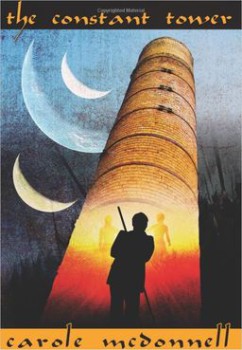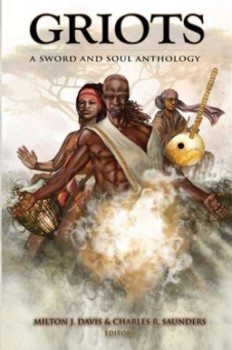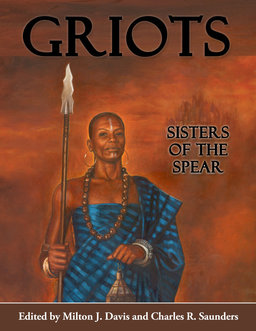The Constant Tower by Carole McDonnell
 When I started my blog (Swords & Sorcery: A Blog), one of my goals was to force myself to read new fantasy. I knew I’d get bored pretty quickly if all I did was write about books and stories I’d read many times. As a fan, it’s too easy to allow oneself to get comfortably caught up in a cycle of reading and rereading the same old dusty stack of Howard, Leiber, and Moorcock. My newer go-to books include Norton, Saunders, and Wagner, but most of their books are still between thirty-five and fifty years old.
When I started my blog (Swords & Sorcery: A Blog), one of my goals was to force myself to read new fantasy. I knew I’d get bored pretty quickly if all I did was write about books and stories I’d read many times. As a fan, it’s too easy to allow oneself to get comfortably caught up in a cycle of reading and rereading the same old dusty stack of Howard, Leiber, and Moorcock. My newer go-to books include Norton, Saunders, and Wagner, but most of their books are still between thirty-five and fifty years old.
Like any other person writing, I also wanted people to read my work. Another article about “Queen of the Black Coast” or “Adept’s Gambit” out in the universe was going to bore most readers as much as it would me while writing it. This meant finding my way back into the thicket of current heroic fantasy, which I’d stopped reading a long time ago.
Turns out I picked about the perfect time to start reading heroic fantasy again, as there was an exciting revival taking place. One discovery I made was Milton Davis and the tremendous efforts he was making to write and publish sword & soul stories. My interest was piqued by the idea that someone was doing something different in the genre, not just regurgitating the same heroic fantasy tropes that have been done to death.
When I went from looking at the amazing cover of his and Charles Saunders’s anthology Griots and actually reading the contents (reviewed at my site), I was hooked. Other than Davis and Saunders, I didn’t recognize any contributors to the collection. Several really grabbed me, but the story that I liked best was “Changeling,” a tale of daughterly duty and sibling jealousy by Carole McDonnell.
When I read the followup anthology, Griots: Sisters of the Spear, earlier this year (reviewed here at BG), I was again most affected by Carole McDonnell’s story. Her “The Night Wife” is a sad story of an aging queen’s youngest husband and a succubus-like entity bent on possessing him. Looking around for what else she might have written because I was now definitely a fan, I learned she had two novels: The Constant Tower and Wind Follower. Since I knew her on Facebook (one of the perks of reviewing is I occasionally get to talk to people I’m a fan of), I asked her which I should try first and she suggested The Constant Tower (2013 Wildside Press).
 I almost don’t know where to start describing The Constant Tower. It’s clearly a fantasy novel, but at the same time there’s plenty of things that would normally be found in a science fiction setting. It avoids the too usual elements of standard fantasy. There are no dragons or magic spells and the heroes aren’t warriors or even cunning thieves, but physically disabled scholars. It’s dense with descriptions of the cultures. It’s a strange, intoxicating affair that brought to mind such sui generis works as those of Cordwainer Smith.
I almost don’t know where to start describing The Constant Tower. It’s clearly a fantasy novel, but at the same time there’s plenty of things that would normally be found in a science fiction setting. It avoids the too usual elements of standard fantasy. There are no dragons or magic spells and the heroes aren’t warriors or even cunning thieves, but physically disabled scholars. It’s dense with descriptions of the cultures. It’s a strange, intoxicating affair that brought to mind such sui generis works as those of Cordwainer Smith.
The Constant Tower is set on the world of Odunao. Each night, anybody left unprotected is teleported to a seemingly random location across the globe. With the use of special crystals and towers that seem to have existed before humanity’s advent, the nightly teleportation can be controlled.
Odunao is a broken world cursed by endless warfare. Ruins indicate that a mighty civilization once existed on the world, but is long lost. In these days, the towers that allow the clans to trade and travel are starting to break down, often from, we learn, an almost emotional distress at humans’ actions.
Humans live in clans which build longhouses around the towers. Essentially, each clan lives in a town that travels from place to place. The most knowledgeable tribes can travel wherever they wish, and have taken on the roles of explorers, marauders, and conquerors. They can also anchor themselves to a place and avoid being transported. Those with less skill are limited to traveling between preset locations.
The Wheel Clan is the most powerful tribe in all Odunao and resentment against them is rising when the story begins. In an act of nearly unprecedented brutality, the Peacock Clan kills all the women and girls of King Nahas’s household. In retaliation, King Nahas rallies all members of the Wheel Clan and its allies and begins an equally savage war against the Peacock Clan.
Early in the war, Nahas and his longhouse meet a Peacock sub-clan, the Iden, that is not aware of the war. Nahas decides they will take the women as wives or comfort women, but kill all the men. Before he carries out the planned killings he romances the Iden queen, Ktwala, and marries her. Nahas’s actions set the stage for even more savagery, murders, and betrayals.
She did not ascend the tower, to search for other towers, to see if wild animals lodged nearby ready to eat human carcasses. But all day she dragged bodies out of the bloody longhouse. Only twice did she stop to question her strange work. Only once she said. “Let me leave this longhouse, go out into the world, and allow the coming night to take me away.” That was when she saw her son’s corpse, bloodied, ripped and torn. She looked, unable to grieve, promised her dead brothers she would retrieve their wives, sisters, and daughters. She paused long. Then she lifted Ouis’ arm and pulled his body through the door. Her father she buried. Her son she buried. The others she piled high. All day, all day, she dragged and carried. Until all the corpses — young and old, male and some female — were outside. Night came again and she re-entered the longhouse.
The novel’s focus is on Psal and his foster brother, Ephan, an albino. They are the sons of King Nahas, ruler of all the Wheel Clans. Psal is frail and crippled. In past ages, he would have been killed at birth, but Nahas is a gentler man than his father was. Ephan is the child of an unknown mother, given to Nahas to cement a truce with another powerful tribe. Both boys are studiers, the class which holds the knowledge of medicine, machinery, and — most importantly– keening, the skill of piloting the towers.
Psal, while struggling to find either a place for himself in this world or an escape from it, unknowingly becomes an important part of Odunao’s, and humankind’s, restoration. His journey takes him across Odunao and into contact with clans of which he has never heard, including one that has sunken into savagery. At one point, he is imprisoned in the cold, always dark, far side of the world. His attempts to change the nature of the Wheel Clan are met with anger and murder.
 I am not doing any justice to the creativity on display in The Constant Tower. Each clan has its own complex history and traditions. Among the Wheel Clan, most marriages are triads composed of two husbands and one wife. The most intriguing creation is the Amazon-like Voca Clan. Enraged by the murderous actions of men towards women, they have created a refuge for any woman who seeks them out. Any male children are killed and they replenish their ranks by kidnapping girls from enemy clans. Odunao itself is stalled on its axis and half is always in utter darkness. Wars are fought with spears and arrows, but a skilled studier can communicate via the towers across the planet. This book is so thick with invention, I know I’ll have to reread it to glean it all.
I am not doing any justice to the creativity on display in The Constant Tower. Each clan has its own complex history and traditions. Among the Wheel Clan, most marriages are triads composed of two husbands and one wife. The most intriguing creation is the Amazon-like Voca Clan. Enraged by the murderous actions of men towards women, they have created a refuge for any woman who seeks them out. Any male children are killed and they replenish their ranks by kidnapping girls from enemy clans. Odunao itself is stalled on its axis and half is always in utter darkness. Wars are fought with spears and arrows, but a skilled studier can communicate via the towers across the planet. This book is so thick with invention, I know I’ll have to reread it to glean it all.
McDonnell is a Christian writing fiction that has Christian themes. Parts of the book seem suffused with symbolic importance, but she doesn’t make it easy to pick it all out. I recognized elements of the idea of the “suffering servant” as well as self-sacrifice worked in artfully. The Constant Tower is a work of art by a Christian, not a work of Christian art, by which I mean this isn’t a Christian tract any more than China Mievelle’s novels are Marxist treatises. McDonnell’s world is one with violence and sex. Heroes do things that will upset the reader and some of the most unpleasant characters have moments of sympathy.
The telling of the story is also complex. It’s presented as a compilation of all the tales and records of Psal following the telling of Ephan’s life story.
Now my prince, in my former rendition, I spoke of Ephan’s deeds. Then you asked me to tell the tale again, and this time to tell you Psal’s story. I will play my part. But you must play your part as well. For you it is given the task of forgetting all you have heard of the previous tale and to keep your heart and mind on Psal. Can you do this?
Psal’s story consists of narratives, journals, and songs — a style I found compelling. It’s a wonderful mix of folkore and annals helping establish a sense of reality to McDonnell’s created world. There are moments of poetry and images in The Constant Tower that revisit me.
The Constant Tower is one of the more enthralling books I’ve read in a while, if only because I could not guess what the next page would hold. It’s not a perfect book. While I liked the conclusion, I felt that after all the time and words expended by McDonnell, it arrived a little too abruptly. It is a powerful book, nonetheless, dealing with the ramifications of war, sexual violence, forgiveness, and restoration. It wasn’t always an easy book, but it was one that demanded my attention.
Great review of a great book, Fletcher. I’ve been a fan of Carole’s for a long time and Constant Tower is her best work yet. It’s one of the most imaginative fantasy novels I’ve read in a long time with a well thought out world. Very happy to see a review of it here.
I’ve been reading Davis for a while. I bought some of his books for my class and they have been read by a wide range of students. Both boys and girls have read these. Although I initially bought Changa’s Safari for my African American students this year I did not have a large population of them. It did not slow down the reading a bit.
My secret ambition is to bring exposure to the genres of fiction that I read like sword and sorcery, military sci-fi, Chthulu, etc. Nicolas Sparks, Twilight, Steven King, and Michael/Jeff Shaara remain the heavy weights of the classroom bookshelf.
If I could just get Nicolas Sparks to write a sword and sorcery-werewolf book with a bit of romance…..
In an earlier open letter there was a lot of talk with Sarah Avery and others. I think there will be a surge in strong female characters. Girls tend to read a lot more in my class and they frenzy when they find something they like. I wouldn’t be surprised if a Conan-ette becomes a big hit.
I like the passion that Milton Davis puts into his work with sword and soul and steamfunk.
Great post John.
@Ndoro – Carole McDonnell is one of those authors I will go out of my way to read. Definitely a book that deserves greater attention.
@Wild Ape – getting more kids to read is a project Davis and Balogun Ojedate look to be doing a lot of work on. In this video/gaming age it’s got to take a lot of work to direct a kid’s attention to words on a page.
[…] https://www.blackgate.com/2014/06/10/the-constant-tower-by-carole-mcdonnell/ […]